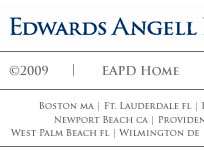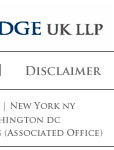
West Tankers: Does It Spell the End for London as the First Choice for Arbitrations?
The recent Judgment of the European Court of Justice (ECJ) in Allianz SpA (formerly Riunione Adriatica Di Sicurta SpA) and Others v West Tankers Inc. (Case C-185/07) means that English courts are now unable to restrain court proceedings commenced in other EU Member States in breach of an arbitration clause. Given London's status as the jurisdiction of choice for many international arbitrations, the case inevitably generated some response. Since the Judgment, a number of cases have clarified its reach and perhaps more significantly, the Ministry of Justice is conducting a consultation process that could reverse the effect of the Judgment.
Anti-suit Injunctions
The power of English courts to stop competing European proceedings through the issuing of anti-suit injunctions had already been curtailed by the ECJ in Turner v Grovit (Case C-159/02). In that case a party to proceedings pending before an English court was restrained from commencing or continuing proceedings before the courts of another Member State because of an exclusive jurisdiction clause. However, the ECJ held that the Brussels Convention, which governs jurisdiction within the EU, precludes anti-suit injunctions against the court of another European Member State. The courts first seised of the matter had jurisdiction to determine the appropriate jurisdiction.
Nonetheless, English courts were still willing to issue anti-suit injunctions in support of arbitration in London on the ground that under Article 1(2)(d) of EC Regulation 44/2001 (the Brussels Regulation), the Brussels Regulation did not apply to arbitration.
The Facts of the West Tankers Case
The litigation in West Tankers arose out of the collision of a vessel, owned by West Tankers Inc. and chartered to Erg Petroli SpA, with a jetty owned by Erg Petroli in Syracuse, Italy. The charterparty was governed by English law and contained an arbitration agreement providing that all disputes arising from the contract were to be dealt with by arbitration in London.
Erg Petroli made claims on various insurances and then commenced arbitration in London against West Tankers. In 2003 Erg Petroli’s insurers, exercising rights of subrogation, commenced proceedings in tort against West Tankers in Syracuse for reimbursement of the amounts they had paid out. The Italian courts had jurisdiction for that claim under Article 5(3) of the Brussels Regulation, as proceedings in tort may be brought in the courts of the Member State where the harmful event occurred.
In September 2004, West Tankers applied for an injunction from the English court to restrain the insurers from taking any further steps in the Italian proceedings on the grounds that they were in breach of the arbitration agreement. The injunction was granted by the High Court which confirmed that, by claiming a right of subrogation under the contract, the insurers were also bound by the arbitration clause. On appeal by the insurers the case was sent directly to the House of Lords. The Lords, in turn, referred the following question to the ECJ:
Lord Hoffman, in order ‘to assist’ the ECJ, gave the opinion that anti-suit injunctions should be permitted. He relied on Article 1(2)(d) of the Brussels Regulation (which provides that the Brussels Regulation does not apply to arbitration) and argued that this exception extended to proceedings which have arbitration as their subject-matter. He said anti-suit injunctions were to protect the contractual right to have a dispute determined by arbitration, so fell outside the Brussels Regulation and could not be inconsistent with its provisions. He added that London could be placed at a disadvantage when compared to other international seats of arbitration were it no longer able to issue anti-suit injunctions.
The ECJ received observations on the matter from both parties to the main proceedings, the French and UK Governments and the EC Commission.
Ruling of the ECJ
The Judgment handed down by the ECJ supported Advocate General Juliane Kokott's interpretation of the issue. The ECJ stated that the key point when trying to establish the application of the Brussels Regulation was to make "reference … solely to the subject-matter of the proceedings." Applying this principle to the current proceedings, the ECJ determined that the subject-matter was the tort claim and such a claim came within the scope of the Brussels Regulation.
The ECJ stated that anti-suit injunctions were contrary to the general rule, established by ECJ case law relating to the Brussels Regulation, that every court, once seised, should have the opportunity to determine its own jurisdiction. The ECJ continued that the Brussels Regulation did not permit any court in a Member State to review the jurisdiction of another court. It also ruled that an attempt to initiate an anti-suit injunction undermined the trust that Member States had for one another's legal systems and judicial institutions.
The ECJ also emphasised the risk that an anti-suit injunction would prevent a proper inspection by the court first seised of a claim that the relevant arbitration agreement was void, inoperative or incapable of being performed. Without a court examining such a preliminary issue a party might lose its judicial protection.
In relation to the application of the New York Convention, the ECJ decided that Article II(3) supported its ruling. This Article states that the court of a contracting state, once seised of an action where the parties have an arbitration agreement, shall, at the request of one of the parties, refer the parties to arbitration unless the agreement is void, inoperative or incapable of being performed.
Subsequent Case Law
In the case of Shashoua & Others v Sharma [2009] EWHC 957 (Comm), the Commercial Court confirmed that West Tankers has not curtailed the English courts power to grant anti-suit injunctions as between England and non-EU member state jurisdictions governed by the New York Convention 1958 (which requires the courts of signatory states to stay proceedings before them, brought in breach of an arbitration agreement). The court did not consider that the West Tankers case had influenced its interpretation of the New York Convention, which was the governing law between the two states in question (England and India). In these circumstances, the courts still seem prepared to take a robust approach to parties who seek to avoid the jurisdiction of the English Courts as the supervisory court of arbitrations in England, as well as, presumably, those who seek to avoid their obligations under valid arbitration agreements.
However, this contrasts with the Courts' post West Tankers approach to anti-suit injunctions within the EU. In Youell v La Reunion [2009] EWCA Civ 175 the Court of Appeal applied the decision, reaffirming its application within EU member states.
What Next
The two cases referred to above show that the English Courts' are strictly interpreting the West Tankers decision. However, they add little else to the current debate surrounding anti-suit injunctions. What is of more significance is the Ministry of Justice consultation process on proposals to amend the Brussels Regulation, which is due to be concluded in September 2009 (on which the decision in West Tankers was based). The consultation is being conducted following publication of the 'Report from the Commission to the European Parliament, the Council and the European Economic and Social Committee on the application of Council Regulation (EC) No 44/2001 on jurisdiction and the recognition and enforcement of judgments in civil and commercial matters' and the corresponding Green Paper, both dated 21 April 2009. The Green Paper contained the following proposal:
If adopted, this proposal could have the effect of restoring the English courts' ability to grant ant-suit injunctions for proceedings commenced in other EU Member States in breach of an arbitration clause, effectively reversing the affect of West Tankers. This proposal may be popular with some, however the International Bar Association (IBA), in its 'Submission to the European Commission', dated 15 June 2009, stated:
Comment
For the time being, the ECJ ruling means that London has lost a useful weapon in its arbitral armoury. The ability to avoid these sorts of jurisdictional issues by obtaining anti-suit injunctions was promoted as one of the perks of choosing arbitration. English courts are now unable to stop a party from intentionally creating delay by issuing court proceedings in another Member State in breach of an arbitration agreement. However, English courts are still able to grant anti-suit injunctions to restrain proceedings outside the EU and Lugano countries (Switzerland, Iceland and Norway) and hopefully other factors, not least location, language and neutrality, will remain more important considerations when parties are deciding on an arbitration venue.
Additionally, the impact of the ruling may not be as severe as it first appeared. It does not mean that court proceedings in other Member States cannot be stopped, but that it will be for that Member State's courts to consider the validity of the arbitration agreement in question. It is of note that the IBA does not feel it appropriate for the law to be changed to reverse this fact. However, the English courts' ability to issue anti-suit injunctions was certainly a factor to take into account when deciding on a venue for arbitration, and any possible amendments to the Brussels Regulation will be eagerly awaited by some.
In the meantime, it would be advisable for any party to a contract with an arbitration clause stipulating a seat of arbitration in Europe to review the validity of that arbitration agreement under the laws of each of the (possibly many) European jurisdictions connected to that contract.
Contacts
The information in this newsletter is for general guidance only and is not intended to be a substitute for specific legal advice. If you would like any further information please contact:

Antony Woodhouse
Partner, Insurance Litigation - London
t: +44 (0) 20 7556 4522
e: AWoodhouse@eapdlaw.com

Johnny McDonald
Trainee Solicitor, - London
t: +44 (0) 20 7583 4055
e: JMcdonald@eapdlaw.com









